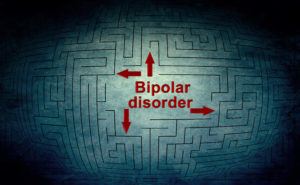What is Manic Depression?

According to the National Alliance on Mental Illness (NAMI) website, “scientists have not yet discovered a single cause of bipolar disorder.” NAMI reports that factors such as genetics, stress, and brain structure and function may contribute to manic depression. While it can occur earlier, the average age of onset is about 25 years old.
“About 2.8% of the U.S. population is diagnosed with bipolar disorder and nearly 83% of cases are classified as severe,” NAMI reports. “If left untreated, bipolar disorder usually worsens. However, with a good treatment plan including psychotherapy, medications, a healthy lifestyle, a regular schedule and early identification of symptoms, many people live well with the condition.”
Signs and Symptoms of Manic Depression
The symptoms of manic depression can vary in severity, according to NAMI. A person may experience extreme symptoms of both mania and depression but may also experience long periods of time symptom-free.
“The condition is not the same for every person who has it,” according to a Healthline article written by Michael Kerr. “Some people may experience mostly depressed states. Other people may have mostly manic phases. It can even be possible to experience both depression and manic symptoms simultaneously.”
Mania
An article by Melinda Smith, M.A., and Jeanne Segal, Ph.D., on Helpguide.org describes mania as a feeling of “heightened energy, creativity, and euphoria” where you
“may talk a mile a minute, sleep very little, and be hyperactive. You may also feel like you’re all-powerful, invincible, or destined for greatness.”
Smith and Segal warn that the good feelings that come from mania can spiral out of control. In addition to reckless behavior, “you may also become angry, irritable, and aggressive – picking fights, lashing out when others don’t go along with your plans, and blaming anyone who criticizes your behavior.”
The list of common signs and symptoms of mania, according to the Cleveland Clinic, may include:
- “Excessive happiness, hopefulness, and excitement
- Sudden changes from being joyful to being irritable, angry, and hostile
- Restlessness
- Rapid speech and poor concentration
- Increased energy and less need for sleep
- High sex drive
- Tendency to make grand and unattainable plans
- Tendency to show poor judgment, such as deciding to quit a job
- Drug and alcohol abuse
- Increased impulsivity”
“Some patients can become psychotic,” according to the Cleveland Clinic’s website, “seeing and hearing things that aren’t there and holding false beliefs from which they cannot be swayed.”
Depression
In their Helpguide.org article, Smith and Segal write that regular depression and bipolar depression present differently:
“For example, bipolar depression is more likely to involve irritability, guilt, unpredictable mood swings, and feelings of restlessness. With bipolar depression, you may move and speak slowly, sleep a lot, and gain weight. In addition, you’re more likely to develop psychotic depression – a condition in which you lose contact with reality – and to experience major problems in work and social functioning.”
However, some of the symptoms of bipolar depression and major depression are the same. The Cleveland Clinic provides a list of symptoms common in both bipolar depression and major depression:
- “Sadness
- Loss of energy
- Feelings of hopelessness or worthlessness
- Loss of enjoyment from things that were once pleasurable
- Difficulty concentrating
- Uncontrollable crying
- Difficulty making decisions
- Irritability
- Increased need for sleep
- Insomnia or excessive sleep
- A change in appetite causing weight loss or gain
- Thoughts of death or suicide
- Attempting suicide”
“The lows of bipolar depression are often so debilitating that people may be unable to get out of bed,” according to NAMI.
Manic Depression Diagnosis
According to the Healthline article, a diagnosis of manic depression is complex. A mental health professional has to consider more than current symptoms – they review the patient’s history of related problems and symptoms.
“Most patients will only seek help during a depressive episode, so it’s important for your primary care provider to perform a complete diagnostic evaluation before making a diagnosis,” the Healthline article reports.
According to the NAMI website, there are two primary types of bipolar disorder:
- Bipolar I. The person will have experienced at least one episode of mania and at least one episode of depression. Misdiagnosis may occur if someone has several depressive episodes before having a manic one or if they haven’t reported previous manic episodes. “To get an accurate diagnosis, it’s essential that the psychiatrist consult with the family as well as the individual with the condition.”
- Bipolar II. This person’s mood changes tend toward depressive rather than manic. However, “to be diagnosed with bipolar II, someone must also have experienced at least one hypomanic episode – a less severe type of mania, in which the person has no psychotic symptoms.”
“Often, people in manic episodes deny that they have a condition and that they need help. They’re often reluctant to give up the energy and excitement of their condition,” NAMI reports. “That disconnect from reality is a characteristic of their condition. People with mania often don’t recognize they have a mental illness until they’ve been through several hospitalizations or episodes of depression.”
Treating Manic Depression
Because manic depression is a chronic, relapsing illness, treatment needs to be continued even when the person feels better, according to the Helpguide.org article.
“Most people with bipolar disorder need medication to prevent new episodes and stay symptom-free,” Smith and Segal write. “Medication alone is usually not enough to fully control the symptoms of bipolar disorder. The most effective treatment strategy for bipolar disorder involves a combination of medication, therapy, lifestyle changes, and social support.”
Coping with Manic Depression

- “Get educated.” Knowledge is power. Learn as much as you can about your condition.
- “Get moving.” Exercise impacts mood and may reduce how many bipolar episodes you experience. “Aerobic exercise that activates arm and leg movement such as running, walking, swimming, dancing, climbing or drumming may be especially beneficial to your brain and nervous system.”
- “Keep stress in check.” Maintain balance and avoid stressful situations, when possible. Meditation, yoga and/or deep breathing may help you relax and minimize stress.
- “Seek support.” Reach out to others for support.
- “Stay closely connected to friends and family.” “Nothing is as calming to the nervous system as face-to-face contact with caring, supportive people who can just listen to you talk about what you’re experiencing.”
- “Make healthy choices.” To help stabilize your moods, stick to a regular sleep schedule and eat healthy foods.
- “Monitor your moods.” To help stop problems before they start, track your symptoms and pay attention to whether your moods are shifting into the danger zone.
Some medications used to treat bipolar disorder are included on the GeneSight Psychotropic report. A complete list of medications can be found here: https://genesight.com/product/.
Our articles are for informational purposes only and are reviewed by our Medical Information team, which includes PharmDs, MDs, and PhDs. Do not make any changes to your current medications or dosing without consulting your healthcare provider.
The GeneSight test must be ordered by and used only in consultation with a healthcare provider who can prescribe medications. As with all genetic tests, the GeneSight test results have limitations and do not constitute medical advice. The test results are designed to be just one part of a larger, complete patient assessment, which would include proper diagnosis and consideration of your medical history, other medications you may be taking, your family history, and other factors.
If you are a healthcare provider and interested in learning more about the GeneSight test, please contact us at 855.891.9415. If you are a patient, please talk with your doctor to see if the GeneSight test may be helpful.








